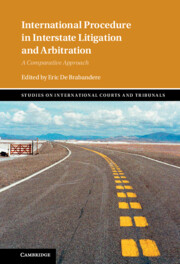Book contents
- International Procedure in Interstate Litigation and Arbitration
- Studies on International Courts and Tribunals
- International Procedure in Interstate Litigation and Arbitration
- Copyright page
- Contents
- Contributors
- Introduction
- Part I Pre-hearing and Selection and Appointment of Judges and Arbitrators
- Part II Post-commencement Litigation Procedure and Strategy
- Part III Evidence and Witness
- Part IV Post-hearing and Effect of Decisions
- 11 Settling a Dispute
- 12 Rule of Precedent and Rules on Precedent
- 13 Cross-Fertilisation and Conflicts between Courts and Tribunals: An Analysis from the Perspective of the United Nations Convention on the Law of the Sea
- Index
13 - Cross-Fertilisation and Conflicts between Courts and Tribunals: An Analysis from the Perspective of the United Nations Convention on the Law of the Sea
from Part IV - Post-hearing and Effect of Decisions
Published online by Cambridge University Press: 18 November 2021
- International Procedure in Interstate Litigation and Arbitration
- Studies on International Courts and Tribunals
- International Procedure in Interstate Litigation and Arbitration
- Copyright page
- Contents
- Contributors
- Introduction
- Part I Pre-hearing and Selection and Appointment of Judges and Arbitrators
- Part II Post-commencement Litigation Procedure and Strategy
- Part III Evidence and Witness
- Part IV Post-hearing and Effect of Decisions
- 11 Settling a Dispute
- 12 Rule of Precedent and Rules on Precedent
- 13 Cross-Fertilisation and Conflicts between Courts and Tribunals: An Analysis from the Perspective of the United Nations Convention on the Law of the Sea
- Index
Summary
Under the United Nations Convention on the Law of the Sea (UNCLOS), four tribunals are provided to interpret and apply the Convention. When it was concluded, the enumeration of the four tribunals, including permanent courts such as the International Court of Justice (ICJ) and the International Tribunal for the Law of the Sea (ITLOS), was said to lead to the risk of fragmentation of UNCLOS. However, so far, they seem to have successfully avoided such risk by interpreting and applying the Convention harmoniously, in other words, through the harmonised operation of UNCLOS. Meanwhile, the fact that the operation of UNCLOS is still at an early stage should be noted. The more cases these tribunals handle, the more flexibility they lose. This loss of flexibility may become a new cause of fragmentation of UNCLOS, because if each tribunal is bound by its own case law and adheres to it, it becomes difficult for each tribunal to take into account the decisions of other tribunals and operate UNCLOS uniformly. Against this background, this chapter contrasts the practice of courts and tribunals established under the UNCLOS in relation to cross-fertilisation and consistency in legal findings. This chapter also discusses how harmonised operation of UNCLOS can be reconciled with differences in the practice of the UNCLOS tribunals.
Keywords
- Type
- Chapter
- Information
- International Procedure in Interstate Litigation and ArbitrationA Comparative Approach, pp. 401 - 423Publisher: Cambridge University PressPrint publication year: 2021



